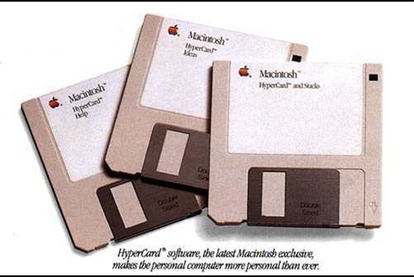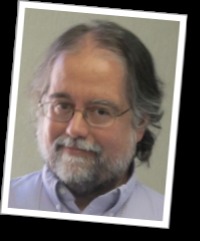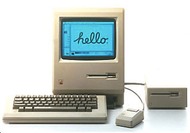My life is more than my work
You always remember your first: In 1984, I was considering buying a Commodore as my first computer, one of those old-school machines with green text on a black background (hey, wait a minute!). Then my friend Steve (a third one, not the two Apple founders) invited me over to look at his new computer, the Macintosh. He had ordered it at the January 24, 1984 Apple stockholders meeting, its introduction, 2 days after the famous "why 1984 won't be like 1984" SuperBowl commercial. I soon ordered one myself, and never looked back. My years on the job using the Windows ® operating system so highlighted the superiority of the Mac OS in most areas, even though I had an MIS department at work and none at home.
In 1984 it was just "the Macintosh".
Creedmoor Psychiatric Center: I did all the usual computery "job stuff", but I was the main person in our Social Work Department to conceptualize plans and procedures into interactive forms. I like to think that they were clear and concise, & they documented and even informed the clinical and case-management work that folks were doing.
Baltic Street Computer Skills Center: I taught MS Word, Excel, and Access to clients recovering from mental illness, wanting to return to (or first enter) the world of work, in the Baltic Street Computer Skills Center. I've trained line staff and hospital administrators in computer use in general, and in Excel and Access particularly. I was trained to be a trainer in the truly terrible custom charting and billing program used by the New York State Office of Mental Health, the Mental Health Automated Record System, or MHARS (pronounced like the cold, dim, arid, lifeless planet).
Facebook & the Internet: Millions use these. I've used them to reconnect to folks I lost track of years ago. For instance, I've had several recent dinners with guys I haven't seen since high school graduation. I also made a Facebook fan page and other forums for Liz's art (see Arts). Facebook in particular lets me keep a low level of contact with folks I would lose altogether without it. Daily friends, I call and see without Facebook.
HyperCard: After completing graduate school, I looked at my Mac and asked, "what else besides writing papers can I do with this?" Apple Computer (as they were known then, now Apple Inc.) had just released HyperCard. Even folks who used it productively, and loved it, struggled to answer the question "What is it, exactly?" It was the first World Wide Web browser & website creator; it wasn't recognized as that because the "www" had not been invented yet!

In ancient history (1987), quality software fit on floppy disks.
HyperCard had built into it HyperTalk, which is still the most English-like programming language ever. Myst, the record-breaking hit game, was written in HyperCard. Some folks wrote custom stacks to run their entire business ... billing, accounts receivable & payable, inventory, ordering, the works. I wrote many scripts with this, and I raised a little money for Gay Men's Health Crisis to combat AIDS with a HyperCard stack (program) that did Tarot card readings. It's sad that Apple long ago walked away from this program over internal struggles. But my favorite stack was my own address book, which did a dozen or more customized things ... one example is sorting one way for people and differently for businesses.
It was easy for me to take input someone typed in and strip out dashes, parentheses, and other non-digits to use it (think phone numbers or credit cards). Why can't websites do that today, 15 years later? They force you to input it their way instead, with no correction from the computer: lazy programmers or bad tools?
I'm now teaching myself Ruby, the latest "most English-like programming language." I've gone from a 16-line script that produces all the lyrics of "99 Bottles of Beer on the Wall" (see left … it looks like more "lines" because of the comments and the narrow column), to another that takes a start year and an end year that you enter, then lists all of the leap years (the complete Gregorian Calendar implementation) between them. That took 24 lines. HyperCard still looks simpler and at least as powerful, but Ruby has two big advantages:
(1) it's not PowerPC-Mac-only … Mac OS X 10.2 to the current 10.7 & surely beyond, Windows, Linux, Solaris, etc.; and
(2) it's not dead.
I met Ruby in one of the many fun and inexpensive classes, in unlimited topics, that I've discovered at the Brooklyn Brainery. Thanks, Soma & Jen!
New York Macintosh Users Group: Back when people still spoke face-to-face instead of texting on cellies, users' groups held monthly meetings and shared info, answered questions, problem-solved, and hung out together. There were Special Interest Groups (SIGs) on different topics, and I co-led a SIG on HyperCard for 10 years with various co-leaders. I once helped a doctor from a cardiac care unit trouble-shoot his HyperCard stack to simplify charting, among other unique projects folks brought in. I organized the Hands-On Room at the annual NYMUG MacFair for many years, and I wrote some articles and software reviews for their monthly Mac Street Journal, as did my fellow member David Pogue. I had a stint as the Managing Editor of the MSJ as well. The now-defunct NYMUG has many alumni in the currently-active Manhattan MUG, MetroMac.

